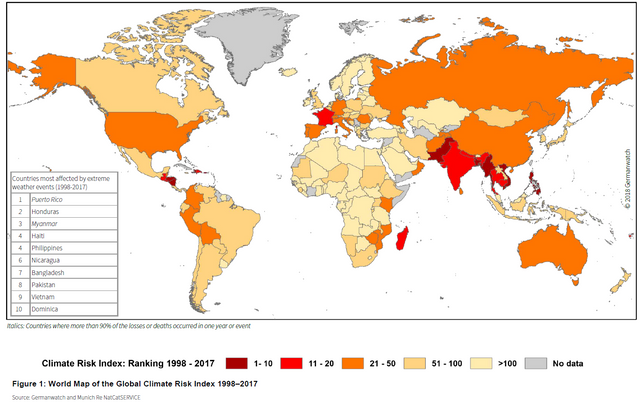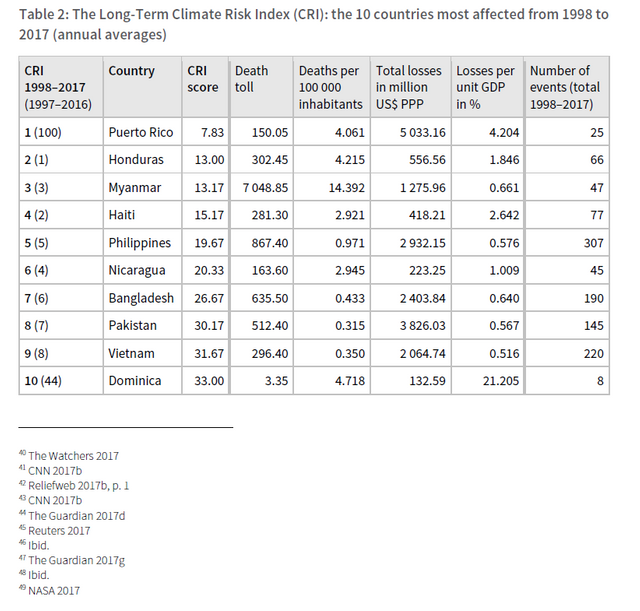As COP24 unfolds, I'll pick up threads from various newsfeeds and distill the messages of the day into morsels we can digest, with a bias towards our African perspective where I can find good reporting that reflects it. Yesterday's introductory post set the scene for a week and a half's worth of global focus on global warming, about which Sir David Attenborough has said, "The collapse of our civilizations is on the horizon".
What did I pick up in general and about yesterday's (Tuesday 4 December) proceedings?
- political leadership is being raised as a critical issue - from some unexpected quarters
- negotiations, both technical and financial, began
- discussions on green finance were initiated
- the Conversation includes perspectives on the "just transition"
- a Climate Risk Index was published
- meeting targets: progress to date
- India has a seriously good news story to tell.
Leadership - youth takes on age with gusto
In general it appears there's a mixture of frustration and sadness that key world leaders Donald Trump (US), Angela Merkel (Germany) and Scott Morrison (Australia) are not attending. (To be fair, Angela Merkel is currently in the US, having just attended the State funeral for former President George H. W. Bush - that's arguably a tough diplomatic call, given his influence over German reunification at the end of the Cold War.)
However, the most pointed criticism directed exquisitely effectively at adult leadership is from Swedish teenager Greta Thunberg.

“For 25 years countless people have come to the UN climate conferences begging our world leaders to stop emissions and clearly that has not worked as emissions are continuing to rise. So I will not beg the world leaders to care for our future,” she said. “I will instead let them know change is coming whether they like it or not.”
“Since our leaders are behaving like children, we will have to take the responsibility they should have taken long ago,” she said. “We have to understand what the older generation has dealt to us, what mess they have created that we have to clean up and live with. We have to make our voices heard.”
Youch.
The negotiations have started
Since COP24 is the 24th Conference of the Parties, negotiations on technical matters are not new. They cover the development and agreement of monitoring, reporting and verification processes in support of a "rulebook" which will govern the implementation of the Paris Agreement and in many ways these technical negotiations must be about fine-tuning processes well-established through the 23 previous COPs. Looking forward to being proved wrong here. In any case, this will be known as the Paris Agreement Work Program, or for short, the Paris Rulebook.
Green Finance
Euractiv presents a good summary of the practical ways in which regulators, particularly in Europe, are looking to "green" financial flows into Europe. In particular these measures relate to disclosing climate-related risk and looking at long-term risks systemically (from a climate perspective), incorporating Environmental, Social and Governance (ESG) risk assessment in banks' reporting requirements.
The "Just Transition"
The Sustainable Development Goals, which I wrote about here, are all about inclusive growth and sustainable development. And yet growth cannot continue unabated without running into some natural boundaries, as I explored in this post on Johan Rockström's planetary boundaries.

France's pullback from implementing a fuel tax intended to reflect environmental costs and shift the French economy more towards green energy has dismayed the participants - but the situation reflects the complexity of trying to find and stay in that "just space" for humanity through a "just transition". Look for this to get harder, not easier, regardless of the quality of leadership.
Poland's President, Andrezj Duda, unveiled the "Solidarity and Just Transition Silesia Declaration" on 3 December, intended to complement the Paris Agreement, with these words:
“Social dialogue is crucial to ensure that the transition to a low-carbon economy is based on solidarity and justice. Solidarity and justice, i.e. where the human being is at the centre; one which, in addition to the need to reduce emissions, takes into account the need to combat poverty, exclusion and social marginalisation and to involve vulnerable groups of citizens in the process of shaping public policies.” Source
He's captured what a hard shift Greta Thunberg is urging us to take for her generation's sake...and for the sake of the generations to follow.
Climate Risk Index
The last two years have gifted us with hurricanes, typhoons and tropical cyclones at strengths we've never seen before. We've seen people dying in heat waves in Europe and in Canada (my home town of Montreal was particularly badly hit this last summer). A Non-Governmental Organisation (NGO) called Germanwatch publishes a global Climate Risk Index annually, which shows the extent to which countries have been affected by the impacts of weather-related loss events such as storms, floods, heat waves and the like. The report brought news which should be of deep concern, both to decision-makers and to people living in climate-vulnerable areas. Here's what it's meant for countries between the years 1998 and 2017.
What do those red and dark orange spots mean in numbers? Here are the stats for the 10 countries worst affected (from the same report), and they are deeply sobering:
The fact that it is developing countries which have borne the brunt of these shifts in weather patterns, despite the viciousness of the storms we've seen lashing the United States the last few years with their attendant loss of life and billions of dollars in property destruction and damage (and onward impacts into the insurance industry), tells us it was beyond awful for those in countries where the support systems are more fragile.
Meeting targets
In the end, it boils down to all countries working together, in partnership with their communities and businesses, to help meet the carbon emissions targets set out in the Paris Agreement (keeping global warming to "only" 2 degrees Celsius above pre-industrial levels, or meeting the more ambitious target of 1.5 degrees Celsius). Those targets sound easy, but in reality the "Business as Usual" scenario, where we get to keep our energy systems more or less the same and perhaps get a bit more efficient around fossil fuel usage, simply won't come anywhere near meeting those targets.
So how are developed and developing countries doing?
Developed country emissions
The encouraging trend seen the last five years of carbon emissions from developed countries lowering has reversed, and developed country emissions have now started to rise again.
The International Energy Agency (IEA) reported in a press release that they expect CO2 emissions in North America, the European Union and other advanced economies in Asia Pacific, to rise by about 0.5% in 2018. Although coal use is declining in these economies, the use of other fossil fuels such as oil and gas unfortunately more than offset the improvements in coal usage.
Faith Birol, the IEA's Executive Director, had this to say:
“This turnaround should be another warning to governments as they meet in Katowice this week. Increasing efforts are needed to encourage even more renewables, greater energy efficiency, more nuclear, and more innovation for technologies such as carbon capture, utilisation and storage and hydrogen, for instance.”
It's ironic, not in the Alanis Morissette sense but in the truly ironic sense, that this conference is being hosted in the heart of Polish coal country. Katowice, the host city, is in the centre of Silesia, which is home to some 90 000 coal workers - about half of the total complement of coal workers...in Poland? No, in the European Union. Er, I think that still includes the United Kingdom, but let's not get distracted by other Big Issues. The Big Issue that COP24 will address is anthropogenic climate change, global warming driven my human-made carbon emissions, and Katowice is smack in the middle of coal country, so it should make for some extremely interesting dynamics over the next nine days. The choice of venue, and the fact that Poland has already hosted a previous COP, speaks to some strong global leadership and vision in that country.
Indonesia, a developing country we should watch closely
In this article, we see that despite being a developing country, Indonesia is one of the world's biggest emitters of greenhouse gases, currently coming in at number 5. Is it fair to single them out? No - South Africa probably doesn't rank far behind. But Indonesia's plans to build more than a 100 new coal-fired plants, and their approach to land use which drives deforestation in favour of palm oil production, do not bode well. Their rainforests, which are not only havens for biodiversity (including the increasingly endangered orangutans), are also essential carbon sinks for our world. They breathe carbon dioxide and give us back oxygen. We need them.
Yay! Good news from India
I'm not going to finish on a bad news note - this is only my second post on this conference and the participants still have a long way to go. So here's some (really) good news from India. It's on track to achieve two of its three Paris Agreement goals ahead of the 2030 deadline. It had three key targets:
- To achieve 40% of electric power installed capacity from non-fossil fuel by 2030, representing a jump of 33% over non-fossil fuel capacity of 2015
- To reduce the emissions intensity of its gross domestic product (GDP) by 33-35% from the 2005 level to 2030, through an increased focus on energy efficiency and renewable energy, to include 175 gigawatt (GW) of renewables by 2022, the development of 25 solar industrial parks, and for India to anchor the global solar alliance
- To create an additional 2.5-3.0 billion tonnes of carbon sinks – reservoirs that accumulate and store carbon dioxide, through the planting of additional forest and tree cover.
The US-based Institute for Energy Economics and Financial Analysis (IEEFA) found the following with respect to the first two targets:
“For the first goal, IEEFA predicts that installed non-fossil fuel capacity in India will exceed 40 per cent by end of 2019 [their target was 2030]. And at the current rate of 2 per cent reduction per year in emission intensity of its gross domestic product (GDP), India will likely achieve 33-35 per cent of emission intensity reduction targets a decade ahead of target."
Cautious takeaway after the first days
It can be done, targets can be achieved, and we look for leadership from countries like India rather than our traditional global leaders. Even the President of Poland, a leading coal nation, is speaking in terms of a just transition. We haven't heard much about China from COP24 yet, but I suspect we'll be getting significantly good news (and yes, leadership) from them over the coming days.
Greta might yet become less disgusted with her elders.
References
https://en.wikipedia.org/wiki/COP24
https://unfccc.int/process-and-meetings/the-paris-agreement/what-is-the-paris-agreement
http://cop24.gov.pl/presidency/key-messages/
https://edition.cnn.com/2018/12/03/europe/attenborough-cop24-climate-conference/index.html
https://www.germanwatch.org/en/16046
https://www.germanwatch.org/sites/germanwatch.org/files/Global%20Climate%20Risk%20Index%202019_2.pdf
https://www.euractiv.com/section/climate-environment/news/cop24-diary-day-3/
https://www.sbs.com.au/news/cop24-swedish-teen-activist-tells-world-leaders-they-are-behaving-like-children
https://www.theguardian.com/environment/2018/dec/04/leaders-like-children-school-strike-founder-greta-thunberg-tells-un-climate-summit
https://www.vox.com/energy-and-environment/2018/12/5/18126145/indonesia-climate-change-deforestation

Team South Africa banner designed by @bearone


Downvoting a post can decrease pending rewards and make it less visible. Common reasons:
Submit
I agree with the young lady from Sweden, more money is spent on attending meetings, accommodation and socializing than is being spent on implementing structures the whole world's population must learn to live with.
Talk is cheap, outright bans need to be put into place, not by country, in every part of the world. People are more concerned about being PC in language, accepting each other, who smokes what, who is having sex with whom, instead of matters of critical importance to our future generation.
About time climate change is not only debated, implement rules and followed through, (before) well in essence it is already too late, maybe we could slow it down.
Downvoting a post can decrease pending rewards and make it less visible. Common reasons:
Submit
@joanstewart for POW (President of the World). Or maybe Deputy President, with Greta Thunberg as President :-).
Downvoting a post can decrease pending rewards and make it less visible. Common reasons:
Submit